Dental Implant Bridge
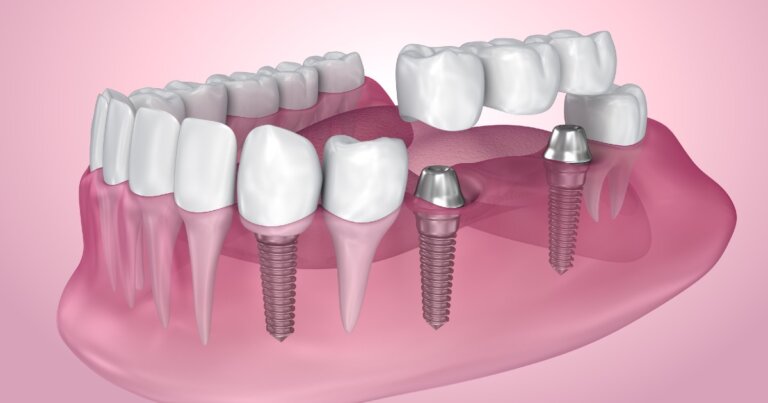
What Is A Dental Implant Bridge?
A dental implant bridge is a prosthetic device used to replace one or more missing teeth by utilizing dental implants as a secure foundation. Unlike traditional dental bridges that rely on adjacent natural teeth for support, the dental implant bridge is anchored directly into the jawbone through the integration of dental implants. This process ensures unparalleled stability and durability, giving patients a long-lasting solution that mimics the look, feel, and function of natural teeth. Before you deciding on whether Dental Implant Bridge are right for you, there are some things you should know:
- Who Needs A Dental Implant Bridge?
- What Are The Different Types Of Dental Implant Bridge?
- What Are Dental Implant Bridges Made Of?
- What Are The Advantages Of A Dental Implant Bridge?
- What Are The Alternative Treatments If I Do Not Choose A Dental Implant Bridge?
- How Much Does A Dental Implant Bridge Cost?
- What Are The Steps In The Dental Implant Bridge Procedure?
- Can I Have A Dental Implant Bridge If I Am Pregnant?
- What Are Common Problems with A Dental Implant Bridge?
If you have any further questions about Dental Implant Bridge or other dental services offered at Atlas Dental, please contact us.

Free phone consultation
Have questions about dental implant bridges? Schedule a free phone consultation with our Toronto dentist.

5 star google reviews
Our patients love us! See for yourself why people are choosing Atlas Dental in Toronto for dental implant bridge.

Dental Implant Bridge Emergency Service
Are you having trouble with your dental implant bridge? Book an emergency appointment today.
Who Needs A Dental Implant Bridge?
A dental implant bridge can be an excellent solution for individuals who have experienced tooth loss or are facing significant dental challenges. If you find yourself in any of the following situations, a dental implant bridge might be the ideal restorative option for you:
- Missing Teeth: The most apparent indication for a dental implant bridge is having one or more missing teeth. Whether you lost a tooth due to injury, tooth decay, or other dental issues, an implant bridge can fill the gap effectively, restoring both your smile’s appearance and function.
- Traditional Dentures Wearers: If you are currently using traditional dentures and find them uncomfortable or unstable, switching to a dental implant bridge could significantly improve your dental experience. Implant-supported bridges offer greater stability, preventing slippage and potential embarrassment while eating or speaking.
- Failing Dental Work: For individuals with failing dental crowns or bridges, a dental implant bridge can provide a more durable and long-lasting solution. Dental implants provide a sturdy foundation, eliminating the need to rely on the support of neighboring teeth.
- Preserving Jawbone Health: When a tooth is lost, the underlying jawbone may begin to deteriorate over time due to lack of stimulation. Dental implants integrate with the jawbone, promoting bone health and preventing further bone loss.
- Enhancing Chewing and Speech: Missing teeth can impact your ability to chew food properly, leading to digestive issues and nutritional deficiencies. Dental implant bridges restore proper chewing function, allowing you to enjoy a varied and balanced diet. Additionally, missing teeth can affect speech clarity, and dental implants can help improve speech patterns.
- Aesthetic Concerns: If you’re self-conscious about gaps in your smile caused by missing teeth, a dental implant bridge can restore a natural and attractive appearance, boosting your self-esteem and confidence.
- Long-Term Dental Solution: Dental implant bridges offer a durable, long-term solution for tooth replacement. With proper care and maintenance, they can last for many years, making them a cost-effective investment in your oral health.
It’s important to note that not everyone is an immediate candidate for dental implant bridges. A thorough dental examination and consultation with a qualified dentist or oral surgeon are essential to determine your suitability for the procedure. Factors such as overall oral health, the condition of the jawbone, and any existing medical conditions will be evaluated to ensure the success of the dental implant bridge. If you have further questions about Dental Implant Bridges, please contact us.
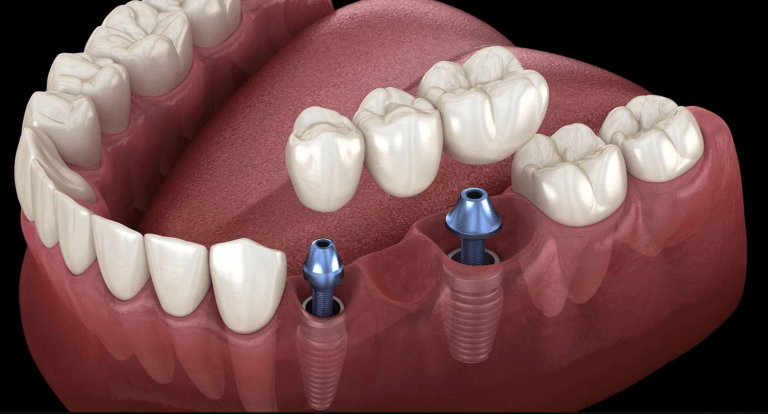
What Are The Different Types Of Dental Implant Bridge?
Dental implant bridges come in various types, each designed to address specific tooth loss scenarios and oral health needs. Your dentist will carefully assess your individual case and recommend the most suitable type of dental implant bridge to meet your requirements. Here are the common types of dental implant bridges:
- Traditional Dental Implant Bridge (Fixed Bridge): This type of dental implant bridge is the most commonly used and is ideal for replacing a single missing tooth or multiple adjacent missing teeth. It involves the placement of one or more dental implants in the jawbone to serve as anchors. The dental crowns, which look like natural teeth, are then fixed onto the implants, bridging the gap and restoring both function and aesthetics.
- Cantilever Dental Implant Bridge: The cantilever dental implant bridge is suitable when there is only one natural tooth adjacent to the gap. In this case, the dental bridge is anchored to a single dental implant, offering a solution for tooth replacement even when there’s no tooth on one side of the gap.
- Implant-Supported Dentures (All-on-4 or All-on-6): For individuals who have lost most or all of their teeth in one or both jaws, an implant-supported denture may be the best option. The All-on-4 or All-on-6 technique involves the strategic placement of four or six dental implants in the jawbone, onto which a complete set of dentures is securely attached. This provides a stable and comfortable solution for full arch tooth replacement.
The choice of the dental implant bridge type will depend on factors such as the location and number of missing teeth, jawbone health, budget considerations, and the patient’s overall oral health. Your dentist will work closely with you to understand your specific needs and recommend the most suitable option. If you have further questions about Dental Implant Bridges, please contact us.
What Are Dental Implant Bridges Made Of?
Dental implant bridges are usually made of two components: the abutment and the porcelain bridge.
- The Abutment is the intermediary component that joins the porcelain bridge to the dental implant in the bone. It is typically made of a titanium alloy metal, but can also be made of zirconia ceramic. The abutment is connected to the dental implant by a prosthetic screw and is connected to the porcelain bridge by dental resin cement.
- The Porcelain Bridge is the part of the prosthetic that looks like a tooth. It sits directly over the abutment and is held onto the abutment by dental resin cement. The porcelain bridge is usually made of zirconia, a type of porcelain that is very hard and durable.
It is worth noting that there are other materials that can be used for dental implant bridges, such as E-max. E-max is is a lithium disilicate glass ceramic. The choice of material depends on the clinical case, the preference of the dentist, and the laboratory technician. Both zirconia and E-max are biocompatible and have excellent esthetic results. They are also very durable, which means they can last for a long time. The choice of the material will also determine the cost of the implant bridge. If you have further questions about Dental Implant Bridges, please contact us.
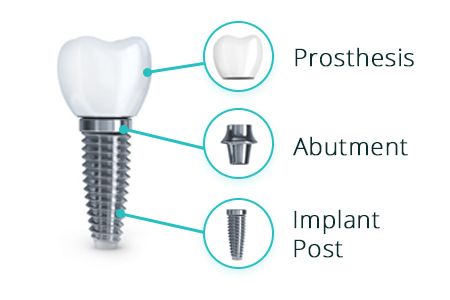
What Are The Advantages Of Dental Implant Bridge?
A dental implant bridge offers a multitude of benefits, making it a popular and reliable solution for tooth replacement. If you are considering this restorative dental procedure, here are some of the key advantages you can expect:
- Enhanced Aesthetics: Dental implant bridges closely resemble natural teeth, both in appearance and function. They are custom-made to match the color, shape, and size of your existing teeth, seamlessly blending with your smile and enhancing its overall aesthetics.
- Improved Oral Function: With dental implant bridges, you can regain the ability to chew, speak, and bite with confidence. Unlike traditional dentures, implant-supported bridges offer exceptional stability, preventing slippage or discomfort while eating or talking.
- Preservation of Healthy Teeth: Traditional dental bridges require the alteration of adjacent healthy teeth to support the bridge. However, dental implant bridges do not rely on neighboring teeth for support, preserving their natural structure and integrity.
- Longevity and Durability: Dental implant bridges are designed to be a long-term solution for tooth replacement. With proper care and regular dental check-ups, they can last for many years, often a lifetime, providing excellent value for your investment.
- Stimulation of Jawbone: Dental implants stimulate the jawbone when you chew or bite, helping maintain its density and preventing bone loss. This is crucial for preserving facial structure and avoiding a sunken appearance, which can happen with prolonged tooth loss.
- No Dietary Restrictions: Unlike some removable dental appliances, dental implant bridges enable you to enjoy your favorite foods without worrying about damaging or dislodging the bridge.
- Improved Confidence and Self-Esteem: Restoring your smile can have a significant impact on your self-confidence. Dental implant bridges look and feel like natural teeth, allowing you to feel more at ease in social and professional settings.
- Convenience and Comfort: Dental implant bridges eliminate the inconvenience of removable dentures. There’s no need for adhesives or taking them out for cleaning, as you care for them just like natural teeth.
- Enhanced Speech: Missing teeth can affect speech clarity. Dental implant bridges restore proper tooth alignment, improving speech patterns and pronunciation.
- No Risk of Tooth Decay: Dental implants and implant-supported bridges are made of materials that are not susceptible to decay. However, maintaining good oral hygiene is still essential to ensure the health of surrounding natural teeth and gums.
- High Success Rate: Dental implant bridges have a high success rate, and the procedure is well-established in modern dentistry. With advancements in technology and techniques, the success and predictability of dental implant placement continue to improve.
It’s essential to remember that dental implant bridges require careful planning and precise placement by an experienced dental professional. Your dentist will evaluate your oral health, medical history, and other relevant factors to determine your candidacy for the procedure. If you have further questions about Dental Implant Bridges, please contact us.
What Are The Alternative Treatments If I Do Not Choose A Dental Implant Bridge?
If you decide not to pursue a dental implant bridge, several alternative treatments are available for replacing missing teeth or addressing dental issues. Each option comes with its own set of advantages and considerations, and your dentist will help you choose the most suitable alternative based on your specific needs and oral health. Here are some common alternative treatments:
- Traditional Dental Bridge: A traditional dental bridge involves the use of dental crowns on adjacent healthy teeth to support a prosthetic tooth or teeth that fill the gap. While this option is less invasive than dental implants, it requires the removal of enamel from neighboring teeth to accommodate the crowns. Additionally, the long-term success of a traditional bridge depends on the health and stability of the supporting teeth.
- Removable Partial Denture: Removable partial dentures consist of artificial teeth attached to a gum-colored plastic base. They are designed to replace multiple missing teeth but are not permanently fixed in the mouth. While they are more affordable than dental implant bridges, they may be less stable and comfortable, leading to potential issues with speech and chewing.
- Complete Dentures: Complete dentures are used to replace an entire set of missing teeth in either the upper or lower jaw. They rest on the gums and may require the use of denture adhesives for stability. Although they are a more cost-effective option, complete dentures may feel less natural than dental implant-supported solutions.
- Resin-Bonded Bridge (Maryland Bridge): A resin-bonded bridge is a conservative alternative for replacing a single missing tooth at the front of the mouth. The artificial tooth is bonded to the back of the adjacent teeth with metal or ceramic wings. It requires minimal alteration of the adjacent teeth and is generally less expensive than dental implants. However, resin-bonded bridges are not as sturdy as implant-supported bridges and may have a shorter lifespan.
- Orthodontic Treatment: In some cases, orthodontic treatment, such as braces or Invisalign clear aligners, may be recommended to close the gap caused by missing teeth. By shifting the existing teeth into the empty space, orthodontic treatment can create a more aligned and aesthetically pleasing smile.
- No Treatment: Although not a recommended treatment option, some individuals may choose to leave the gap caused by missing teeth untreated. This decision can lead to several oral health issues, including tooth misalignment, difficulty chewing, and bone loss in the jaw.
It’s important to remember that while alternative treatments offer various benefits, they may not provide the same level of stability, durability, and natural appearance as dental implant bridges. Dental implants have become the gold standard for tooth replacement due to their exceptional functionality and long-term success. If you have further questions about Dental Implant Bridges, please contact us.
Cost of Dental Implant Bridge
The cost of a Dental Implant Bridge at Atlas Dental depends on the number of Retainers and Pontics involved, as well as the type of dental implant parts required to service your dental implant brand. Retainers are the components used to anchor or support the dental bridge to the dental implant fixtures in the bone, and cost $1207 plus dental lab fee and dental material expense. Pontics are the artificial teeth that replace the missing teeth in a dental bridge and cost $538 plus dental lab fee and dental material expense. A typical 3-unit dental implant bridge (involving 2 retainers and 1 pontic) at Atlas Dental would cost approximately $5500. The codes relevant to Dental implant bridges in the Ontario Dental Association’s Suggested Fee Guide appear as follows:
Retainers, Porcelain/Ceramic/Polymer Glass
- 67205 – Retainer, Porcelain/Ceramic/Polymer Glass, Implant-supported: $1207 + Dental Lab Fee (approximately $500-700 ) + Dental Material Expense ($100-200)
Pontics, Porcelain/Ceramic/Polymer Glass
- 62501 – Pontics, Porcelain/Ceramic/Polymer Glass Fused to Metal: $538 + Dental Lab Fee (approximately $500-700) + Dental Material Expense ($100-200)
The Ontario Dental Association’s Suggested Fee Guide is a proposed fee structure that dentists in Ontario may or may not follow. Please consult with your dentist about fees before going ahead with treatment.
Dental implant bridges are usually considered a supplementary service by dental insurance plans and may or may not be covered by your dental insurance. Sometimes, dental insurance may reimburse you an amount equal to a dental bridge. Be sure to find out from your dental insurance plan provider how much you are eligible for before going ahead with dental treatment. Your dentist can help you submit a predetermination to your dental insurance.
For patients without dental insurance, Atlas Dental is pleased to offer dental financing through Dentalcard. Affordable payment plans start at 7.95% for terms of 6 months to 6 years. To learn more about Dentalcard dental treatment financing, follow this link.
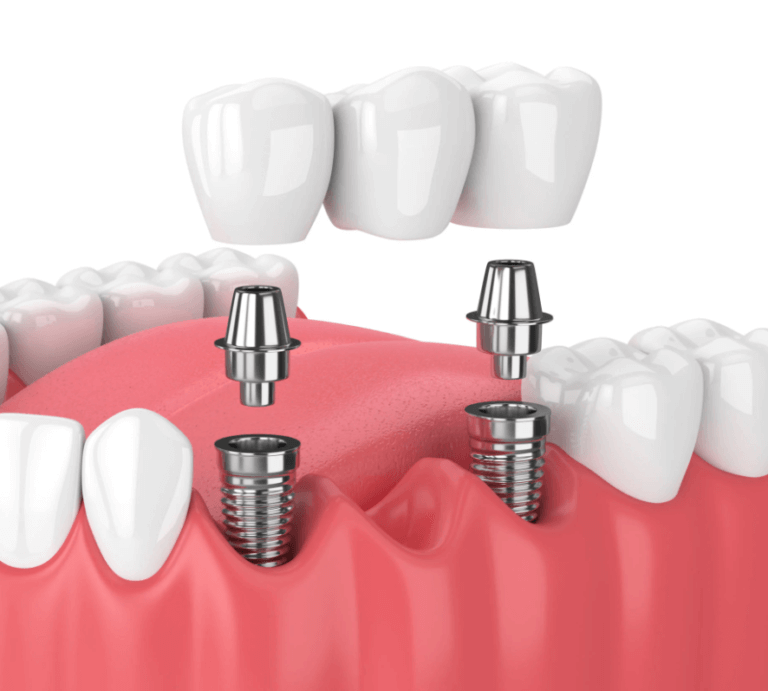
What Are The Steps In The Dental Implant Bridge Procedure?
The dental implant bridge procedure is a comprehensive process that involves several steps to ensure the successful placement and integration of the dental implants. While the exact timeline and approach may vary depending on individual cases, the following are the typical steps involved in getting a dental implant bridge:
- Initial Consultation and Examination: The journey begins with an initial consultation with your dentist or an oral surgeon. During this visit, your oral health will be assessed thoroughly. X-rays, CBCT scans, and dental impressions may be taken to evaluate the condition of your jawbone, gums, and remaining teeth. Your dentist will discuss your dental history, medical history, and any specific concerns you have about the procedure.
- Treatment Planning: Based on the examination results and your specific needs, your dentist will create a personalized treatment plan. This plan will outline the number of dental implants required, the type of dental implant bridge best suited for your case, and the estimated timeline for the entire procedure. Please review these pre-operative instructions prior to dental implant surgery.
- Dental Implant Surgery: The next step involves the surgical placement of the dental implants into your jawbone. This is typically done under local anesthesia to ensure your comfort during the procedure. The dental implants, usually made of titanium, are carefully inserted into the jawbone at precise locations. The number of implants placed will depend on the number of missing teeth and the type of dental implant bridge chosen.
- Healing and Osseointegration: After the dental implant placement, a period of healing is necessary for the implants to integrate with the surrounding bone. This process, known as osseointegration, usually takes a few months. During this time, your dentist may provide temporary dental crowns or a temporary denture to maintain the aesthetics and function of your smile. Please review these post-operative instructions to ensure the dental implant heals properly.
- Abutment Placement: Once osseointegration is complete, a minor surgical procedure is performed to place abutments on top of the dental implants. Abutments are small connector pieces that serve as the foundation for attaching the dental bridge.
- Dental Bridge Placement: With the abutments in place, your dental implant bridge, custom-made to match the color, shape, and size of your natural teeth, is secured onto the abutments. Your dentist will ensure that the bridge fits perfectly and comfortably, providing you with a fully functional and aesthetically pleasing smile.
- Final Adjustments and Follow-Up: After the dental bridge is attached, your dentist will make any necessary adjustments to ensure proper alignment and bite. They will also provide you with detailed instructions on post-operative care and oral hygiene to promote healing and long-term success. Regular follow-up appointments will be scheduled to monitor your progress and ensure the dental implant bridge’s ongoing health and function.
It’s important to note that each patient’s healing process varies, and the timeline for completing the dental implant bridge procedure may differ from one individual to another. Nonetheless, with proper care and maintenance, dental implant bridges can last for many years, offering you a comfortable and confident smile that feels just like your natural teeth. If you have further questions about Dental Implant Bridges, please contact us.
Can I Have a Dental Implant Bridge If I Am Pregnant?
Pregnancy is a special time that requires careful consideration of any medical or dental procedures. When it comes to dental implant bridges, the decision to undergo treatment while pregnant needs to be approached with caution. Dental health is essential during pregnancy, as hormonal changes can make pregnant women more susceptible to certain oral issues.
- Consultation with Your Obstetrician and Dentist: If you are pregnant and considering a dental implant bridge, the first step is to consult both your obstetrician and dentist. It’s crucial to inform your healthcare providers about your pregnancy so that they can take all necessary precautions and make appropriate recommendations based on your specific situation.
- Timing of Dental Implant Bridge Procedure: In most cases, dental implant surgeries are elective procedures and can be postponed until after pregnancy. Dentists and oral surgeons generally prefer to avoid performing non-essential procedures during the first trimester and the latter part of the third trimester, as these are critical developmental stages for the baby.
- X-rays and Anesthesia: During pregnancy, minimizing exposure to X-rays is essential to protect the developing fetus. If dental X-rays are necessary for treatment planning, your dentist will take extra precautions, such as using lead aprons to shield your abdomen and using the lowest possible radiation levels to obtain the required images. Regarding anesthesia, local anesthesia used during dental implant placement is generally considered safe during pregnancy. However, certain medications and anesthesia options may be avoided or adjusted, depending on your pregnancy status.
- Medications and Antibiotics: Before the dental implant procedure, inform your dentist about any medications you are taking, including prenatal vitamins and other supplements. Certain antibiotics or pain medications may be prescribed post-surgery, and your dentist will choose medications that are safe for use during pregnancy.
- Managing Dental Health During Pregnancy: Maintaining good oral hygiene is vital during pregnancy to prevent dental issues that may arise due to hormonal changes. Regular dental check-ups and teeth cleanings are safe during pregnancy and are highly recommended to ensure your oral health is in optimal condition.
- Alternative Dental Solutions: If the dental implant bridge procedure is not suitable during pregnancy, your dentist may suggest alternative solutions, such as temporary restorations, removable dentures, or conservative treatments, to address immediate dental needs.
Ultimately, the decision to proceed with a dental implant bridge during pregnancy should be a collaborative one between you, your obstetrician, and your dentist. By working together and considering your specific health needs, you can make an informed choice that prioritizes both your dental health and the well-being of your baby during this precious time. If you have further questions about Dental Implant Bridges, please contact us.
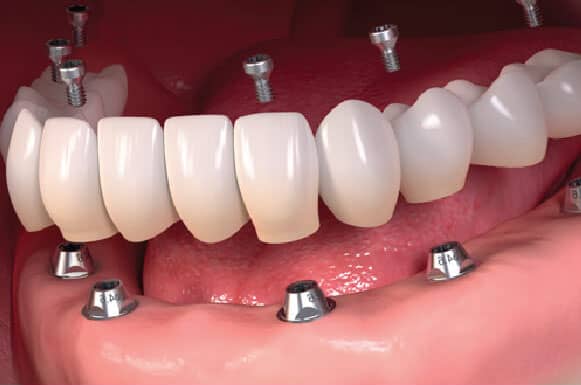
What Are Common Problems With A Dental Implant Bridge?
While dental implant bridges are generally a reliable and successful solution for tooth replacement, like any medical or dental procedure, there can be some potential issues that patients may encounter. Understanding these common problems can help you be aware of what to look out for and take appropriate measures to address them promptly. Here are some of the typical problems that may arise with a dental implant bridge:
- Infection (Peri-implantitis): One of the primary concerns with dental implants is the risk of infection around the implant site, known as peri-implantitis. This condition is similar to gum disease and can lead to inflammation and bone loss around the implant. Regular oral hygiene practices, such as brushing, flossing, and attending dental check-ups, are crucial in preventing and managing infections.
- Implant Failure: While dental implant failure is relatively rare, it can occur in some cases. Implant failure may be due to factors such as inadequate osseointegration (fusion of the implant with the jawbone), excessive forces on the implant, or infection. If an implant fails, it may need to be removed and replaced after the area has healed.
- Nerve or Tissue Damage: During the dental implant procedure, there is a slight risk of nerve or tissue damage. This can result in temporary or permanent numbness or tingling in the lips, chin, or gums. Proper planning and the expertise of the dental professional can minimize this risk.
- Bite Problems and Discomfort: If the dental implant bridge is not aligned properly or the bite is uneven, it can lead to discomfort, difficulty chewing, and potential damage to the restoration. Regular dental check-ups and adjustments can help ensure the bridge functions correctly and remains comfortable.
- Insufficient Bone Support: For dental implants to be successful, sufficient bone density and volume are required to support the implants. In cases of inadequate bone, bone grafting procedures may be necessary to enhance the area before implant placement.
- Food Impaction: Food particles may get trapped between the dental implant bridge and adjacent teeth, leading to irritation and possible gum issues. Proper oral hygiene, including flossing and using interdental brushes, can help prevent food impaction.
- Bruxism (Teeth Grinding): Patients who suffer from bruxism may put excessive pressure on the dental implant bridge, potentially leading to complications. A nightguard or other protective measures may be recommended to prevent damage.
- Gum Recession: In some cases, gum tissue around the dental implant bridge may recede over time, exposing the implant or abutment. This can be managed through gum grafting or other techniques to restore gum tissue.
It’s important to note that most of these problems can be prevented or managed with proper oral hygiene, regular dental check-ups, and following your dentist’s post-operative instructions. If you experience any issues or discomfort with your dental implant bridge, promptly consult your dentist to address the concern and ensure the long-term success of your dental restoration. If you have further questions about Dental Implant Bridges, please contact us.
We also think you’ll like…
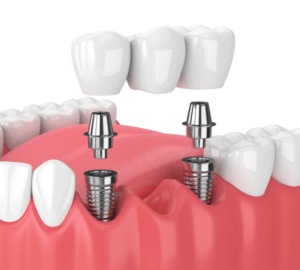
Loose Dental Implant Bridge
Loose Dental Implant Bridge What Is A Loose Dental Implant Bridge? A dental implant bridge is a type of dental prosthetic that is used to
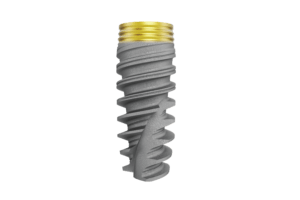
Nobel Dental Implants
Nobel Dental Implants What Are Nobel Dental Implants? Nobel Biocare is a renowned and globally recognized dental implant company that has played a pivotal role

Dental Pain Medication
Dental Pain Medication What Is Dental Pain Medication? Dental pain can range from a mild discomfort to intense throbbing, making even the simplest tasks unbearable.
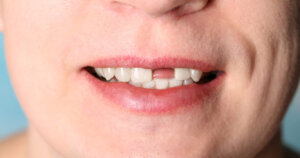
Missing Tooth
Missing Tooth What Is A Missing Tooth? A Missing Tooth refers to a condition where a tooth is no longer present in the mouth, either
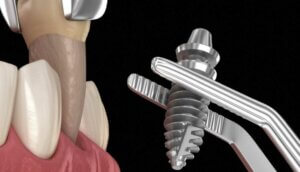
Blue Sky Bio Dental Implants
Blue Sky Bio Dental Implants What Are Blue Sky Bio Dental Implants? Blue Sky Bio is a dental implant company that specializes in providing innovative
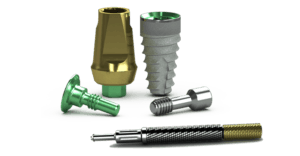
Biohorizons Dental Implants
Biohorizons Dental Implants What Are BioHorizons Dental Implants? BioHorizons is a prominent dental implant company known for its expertise in the design, manufacture, and distribution

